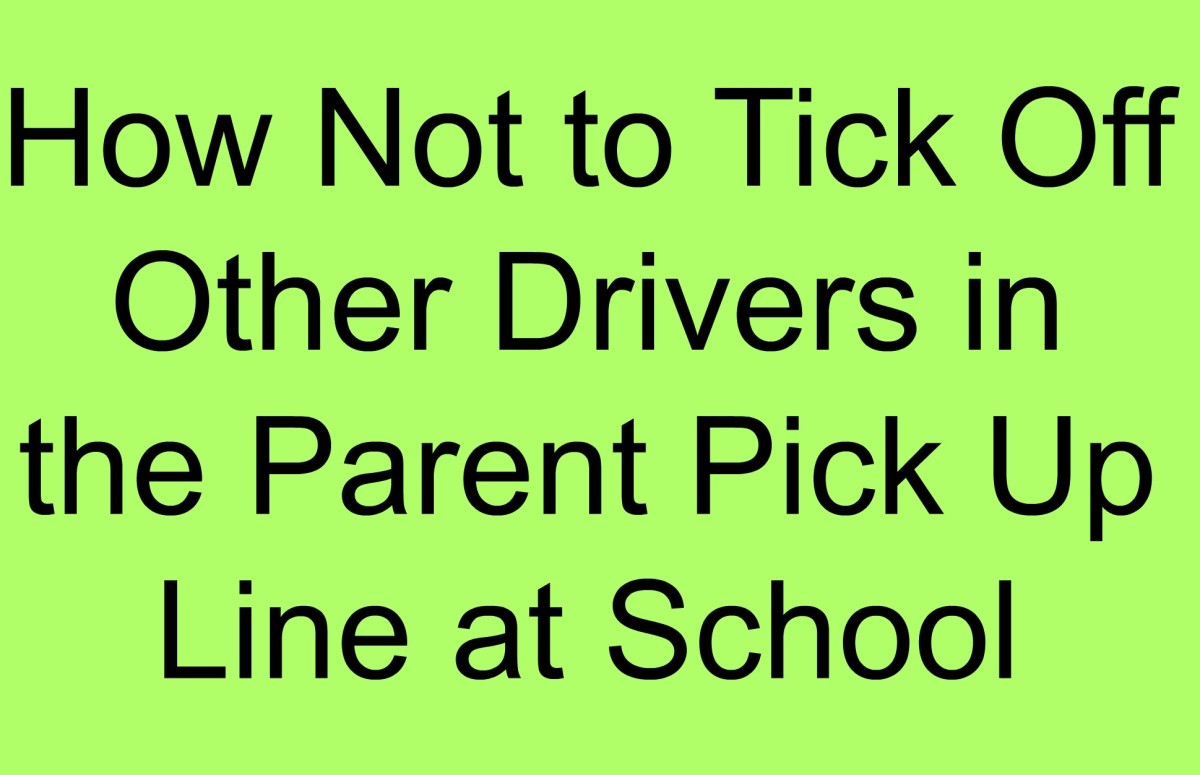- HubPages»
- Family and Parenting»
- Parenting Skills, Styles & Advice»
- Parenting Advice & Tips
Conscious Parenting: 8 Lessons We Must Teach Our Children
Fundamental Concepts in Parenting
Studies have shown that, before the age of 6, a child’s brain is operating at levels below consciousness. Their brain waves show a predominance of delta (0-2 years of age) and theta (2-6 years old) activity, as opposed to the alpha and beta activity predominant in older children and adults. In adults, delta is a state of brain activity associated with sleeping, while theta is associated with day-dreaming. In other words, children below the age of 6 largely exist in a half-dreaming state. Is it any wonder then that they often mix the real with the imaginary?
Delta and theta brain frequencies also define the brain state used by hypnotherapists to upload new behaviour patterns into the receptive subconscious minds of their clients. It is the hypnotic, trance-like state induced in adults who want to change certain aspects of their behaviour. In other words, children under 6 exhibit this trance-like state naturally, and are pre-programmed to download any and all information from their caregivers and their surroundings, with absolutely no filter or capacity to choose or reject that information or to determine if it is true or false.
Each and every single one of us has ‘writing on our walls’, placed there by well-meaning or abusive adults who had influence in our lives when we were young. We downloaded their beliefs, their lies, their fears, and those became our beliefs and our fears. For those of us who are lucky, we downloaded encouraging and loving words—words that comfort us and sustain us well into our adult lives. Some of us may even have downloaded essential truths and virtues—faith, hope, charity, desire for justice, strength of character to stand up for the oppressed, prudence to temper our fortitude in the service of justice.
Though it may be alarming to think that young children are like sponges, absorbing everything—good and bad—from their caregivers, it is also highly instructive for those of us determined to make a positive impact in our children’s lives. After all, it means parents have a significant window of opportunity in which to upload life-affirming beliefs that are character-building and will stand a child in good stead for the rest of his or her life. It is often said that all we need is love, but love in and of itself, without the discipline to constrain destructive behaviour, is at best well-meaning but ineffectual, at worst smothering, leading to highly dependent children unable to think or fend for themselves.
Here are 8 concepts I feel are fundamental in the child-rearing process, and while some need to be uploaded as early as possible to garner the best results, others need to await the age of reasoning, which varies from child to child. But don’t worry if you’ve missed the 0-6yrs window of opportunity: some can pay dividends even if you impart them (or learn yourselves) later in life.
#1: Self-Awareness
- Being Responsible for their Emotions
This is perhaps the most important concept that few of us are ever taught. We go through life getting upset at other people and blaming them for ‘making us feel bad’. The truth is that no-one can make us feel anything unless we allow them to. We give people power over us when we allow them to have control over our own emotions. Teach your children not to give anyone this power over them, not their playmates, not their teachers. Teach them that they have a choice as to how they react every time something happens to them. They can choose to be upset (and pay the price of feeling miserable) or they can choose not to get upset (e.g. by ignoring a bully) and be pro-active about making sure the situation does not happen again.
As Eleanor Roosevelt so famously said: No one can make you feel inferior without your consent. In fact, no-one can make you feel ANYTHING without your consent. In We Have Met the Enemy: Self-Control in an Age of Excess, author Daniel Akst has this to say: What mattered was not what happens to you, but how you handle it. Self-command is required….because for the most part, the self is the only thing that we can command, we have no control, ultimately, over what people do or think. What we can influence is our understanding of these circumstances and how we respond to them.
Teach your child from an early age that they are not subject to the whims of other people, that their emotions are under their control. This mental self-discipline is the first step towards self-mastery, and with it, your child will have a powerful weapon to deploy in dealing with minor upsets and major problems throughout life. They will never blame anyone for anything, but will work towards their goals with a single-mindedness that can bring them all that they desire.
#2 and #3 : Love & Compassion
- Loving themselves—Celebrating their Individuality
- Compassion for Others (the Golden Rule)
If there are siblings, it is often tempting to compare one with the other. Rather than unwittingly pitting them against one another, celebrate each one’s differences, each person’s individuality. We’re each of us unique and that’s what makes this a fascinating world. Assure each of their intrinsic worth, that they’re LOVED equally, but because they’re all different, they’re not all TREATED equally. One may need more attention with homework, while another will manage on their own, but each eventually gets the quality time needed with each parent. Fairness is not absolute (5 pancakes each!) but contingent on each getting what he or she needs.
Young children model their parents’ behaviour, so never denigrate yourself in their presence, even jokingly. Avoid self-deprecating humour. Enough with the: “I’m such a klutz!” when you bump into things. Or: “Your mother’s always absent-minded.” when she forgets the keys. Or: “You can’t carry a tune—that’s your father’s genes showing.” Or: “Girls are bad at maths.” Get rid of all these self-defeating fallacies, or your children will soak them up and internalize them as firm beliefs. Forgive yourself when you make a mistake, and they’ll learn to be compassionate with themselves too. Forgive others who ‘do you wrong’, and they’ll learn to forgive their playmates and friends. Remind them often of the ‘Golden Rule’, and insist on siblings practising it with each other, so that when they go out into the world, they will use it to good effect.
Bully-proof your child. You can only do this if they have a strong sense of who they are and an unshakeable belief that they are loved and lovable. Yes, of course you already love your child, or you wouldn’t even be reading this, but how do you express your love? Are you ‘old-school’ like your own parents were with you, seldom displaying affection? Or are you so determined not to perpetuate your parents’ style that you’re overly permissive and act buddy-buddy with your children, and then wonder why they show you no respect? There is a middle way. With very young children, affection must be freely given, but so must discipline. Discipline a 3-year-old? But yes, it’s not only possible but essential. Get down to their level, both physically and mentally. Couch it in terms they can understand. Heck, watch a few episodes of Super Nanny if you’re really stumped. Watch with horror what can happen if you don’t start discipline early on. Only when you have a child who is disciplined do you have one who can self-discipline, and a self-disciplined child is one who is much more likely to achieve his goals, even if it is only to give his mother time to take care of the crying baby so she can then spend some quality time with him.
Sure, you cuddle your children and you tell them often and sincerely that they’re lovable and very much loved. But do you make sure you tell them that your love for them does not depend on their pleasing you every hour of every day? Unconditional love is a scary concept for a lot of people, because it seems to condone bad and destructive behaviour. But it doesn’t have to be anything you don’t want it to be. All a young child needs to know is that when they misbehave, you don’t stop loving them. Children fear rejection from their parents more than anything else, and you do not need little bundles of insecurity running around. Reassure them that they are always loved, but assure them that unacceptable behaviour will not be tolerated, and make sure they understand that there will be consequences for their behaviour. This further reinforces the idea that other people’s misbehaviour (e.g. a bully) is wrong and need not be tolerated.
#4: Gratitude
Children who have loving, caring parents start off with a huge advantage over those who don’t. It’s hard to get this concept over to a very young child who has no way of knowing any different, but as soon as a child can reason, they can understand the benefits of a safe home, enough to eat, and people who love them, as opposed to not having any of these things. It is imperative that children understand not to take these for granted, that they understand that they are privileged simply to be where they are, safe and loved, and should be grateful for their circumstances. A child who can reason must be taught that material things are all fine and well, but our ultimate possessions are our minds and hearts—something no-one can take away from us, and that is why we should feed both, opening our minds to positive thoughts and our hearts to love.
To really strike home their privileged existence, consider charitable donations to an international aid agency which allows you to ‘adopt’ a child from an impoverished country. Get your children involved in writing to and answering letters from their ‘adopted’ sibling. There is nothing that will open their eyes like a real child their age who has lost one or both parents, who has to walk miles every morning to collect drinking water, who is not allowed to go to school for the sole reason that she is a girl and, for the same reason, is the last to be fed. Suddenly, your children will stop taking everything for granted and be grateful for the clean running tap water they have at their disposal.
#5: Faith in Themselves
- Inner Certitude/Self-Confidence
Be free with your praise, and watch your child blossom. Praise them not only for their achievements, but also for their behaviour. When they treat a sibling with kindness, when they include a new neighbour in their games, when they work hard at a project (even if it ultimately fails), when they attempt something they’ve never attempted before (even if it doesn’t work out in the end), praise them for trying, for taking part, because it takes courage to do something for the first time, because it feels vulnerable out there on their own doing something new with everyone watching, and they’re so very little.
Some children are more sensitive than others, and may need more encouragement to do what other kids just seem to take in their stride, but you’re there to make sure they all reach their full potential, and that’s only possible if you do your part to build and boost their self-esteem with praise and encouragement.
Positive reinforcement works, and with self-esteem comes self-confidence, and one of the greatest gifts you can give your children is faith in themselves. With this inner certitude, they will blast away barriers in their paths and achieve whatever it is they’re meant to achieve. For if there’s one thing that’s for certain, they’re here to fulfil their purpose, whatever that might be, and you’re here to give them a fighting chance.
#6: Faith in Something Bigger than Themselves
- Religion/Spirituality
Faith in oneself is all very well, you may say, but what of the greater meaning of Faith? If your religious faith sustains you, then by all means introduce it to your children. But who’s to say any one faith is better than the others? So much of organized religion polarizes one group of people against another, and yet a study of comparative religion tells us that all the world’s great faiths have much in common. It is all well and good to insist on family traditions and cultural values, and these certainly give one a sense of self and belonging. But once children are of an age to think for themselves, parents are often horrified at their questioning our deepest beliefs. Some even go so far as estrangement, a familial ex-communication that goes against the grain of familial love.
If religion alienates members of the same family, perhaps it says more about a parent’s loss of control over a child’s choices in life than about the religion in and of itself. After all, isn’t it one of a parent’s most pressing duties to make sure their children can actually think for themselves? To put it bluntly, a parent has little control over a child’s choices in life once they can think for themselves. That’s not to say you cannot guide them. Control and guidance are different beasts, and a parent must tread a fine line very lightly indeed in order to steer an intelligent child in a direction he or she may not be naturally inclined to follow. But ask yourself why you feel the need to do this. If it is to exert control or be seen to be able to exert control, you’re doing it for the wrong reasons.
There are beautiful, non-threatening, non-guilt-inducing ways to introduce religion to a child. If you’re unable to come up with any, perhaps you should re-think your beliefs before uploading them into an impressionable young mind.
#7: A Positive Outlook
- Positive Expectations
If you are a worrier, do not make your child one as well. Keep your worries to yourself. Better still, understand the futility of worry. As Mark Twain said: I am an old man and have known a great many troubles, but most of them never happened. Even Thomas Jefferson weighed in on the subject: How much pain they have cost us, the evils which have never happened. Truly, we do ourselves a disservice when we worry, often for naught. In fact, proponents of The Law of Attraction say that we’re actively courting the very trouble we’re dreading, just by dwelling on it. If that doesn’t make you stop, I don’t know what will.
If you insist on watching the news every day, you are downloading gloom and doom into your living-room and straight into the minds of yourself and your children. There are enough complications in their young lives at school and among their peers. They do not need to hear that the world is about to end, that the economy will never recover, that they will have no jobs when they grow up. Children have no way of filtering out exaggerations, rhetoric, pandering, conflicts of interest and hidden agenda.
Instil in them a positive outlook. Teach them to look upon the world with wonder and awe, not with fear and dread. Tell them to expect the positive, and they will encounter situations in which they will bring out the positive. Positive expectations create positive outcomes, just as negative expectations will doom your project before you even start it.
#8: Understanding the Difference between Need and Want
- Understanding the Value of Money
In this materialistic society that we live in, where people are categorized into ‘haves’ and ‘have-nots’, we have bred, through mass media and haphazard parenting, a generation of young people who have serious entitlement issues. The places that we so love to call the First World are characterized not so much by higher standards of living than by outrageously unsustainable life-styles, where people live beyond their means, getting into debt by spending ridiculous amounts on frivolous personal entertainment systems (and that’s just for the children). What one child has, all the others must then have, yet how can they unless parents are complicit? Is it really that much easier to get them out of your hair by paying them off? Is it really too much work to instil in them an understanding of the value of money—the effort of earning it, the wisdom of saving it, the folly of wasting it—and a basic understanding of the difference between Need and Want?
Personal finance should be a mandatory subject in schools, but since it is not, parents have a duty to teach it to their children. But some parents have to learn it themselves, those who are in debt and at the mercy of banks who like nothing better than exploiting ignorant clients who have no idea how credit cards and interest rates work or who lack self-control or who themselves do not understand the difference between need and want. Get help if you’re in debt and make sure your children learn your lesson well. If you’re in good financial health, make sure you impart your wisdom to your children at an early age, as soon as they start demanding things that they do not need.
The poet, Kahlil Gibran, understood the essentials of parenting. Here is an excerpt from The Prophet:
Your children are not your children;
They are the sons and daughters of Life’s longing for itself.
They come through you but not from you,
And though they are with you, yet they belong not to you.
You may give them your love but not your thoughts,
For they have their own thoughts.
You may house their bodies but not their souls,
For their souls dwell in the house of tomorrow, which you cannot visit, not even in your dreams.
You may strive to be like them, but seek not to make them like you,
For life goes not backward nor tarries with yesterday.
You are the bows from which your children as living arrows are sent forth.
The archer sees the mark upon the path of the infinite,
and He bends you with His might that His arrows may go swift and far.
Let your bending in the archer’s hand be for gladness;
For even as he loves the arrow that flies, so He loves also the bow that is stable.
Related Hubs
- Giving Your Child a Head Start in Life
- How to Keep Your Fears Out of Your Kids' Fun
- Teaching Children to Give Back
Teaching children to give back to others in need is an important life skill for kids to learn. Here is a guide to help.










